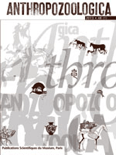
ANTHROPOZOOLOGICA
Scope & Guideline
Unveiling the Complex Tapestry of Human-Animal Relationships
Introduction
Aims and Scopes
- Zooarchaeology and Historical Ecology:
The journal frequently publishes studies that examine animal remains in archaeological contexts, investigating human-animal interactions throughout history and their ecological implications. - Cultural Significance of Animals:
Research often explores the symbolic and cultural roles of animals in different societies, including their representation in art, mythology, and rituals. - Ethnobiological Studies:
The journal includes articles that delve into local knowledge and practices regarding animals, highlighting how cultural beliefs influence human interactions with wildlife. - Animal Behavior and Welfare:
There is a growing focus on understanding animal behavior from both historical and contemporary perspectives, considering welfare implications in various settings. - Multispecies Relationships:
The journal emphasizes the complexities of human-animal relationships, exploring themes of coexistence, mutualism, and the socio-cultural dimensions of these interactions.
Trending and Emerging
- Impact of Climate Change on Animal-Human Relations:
There is an increasing concern regarding how climate change affects animal habitats and, consequently, human interactions with wildlife, as evidenced by studies exploring shifts in species distribution and behavioral adaptations. - Interdisciplinary Approaches:
The journal is witnessing a rise in interdisciplinary research that combines archaeology, anthropology, and environmental science, reflecting a more holistic understanding of human-animal relationships. - Ethnographic Perspectives:
Emerging themes include in-depth ethnographic studies that document contemporary human-animal interactions, particularly in marginalized communities, emphasizing the socio-cultural implications of these relationships. - Animal Welfare and Ethics:
An increasing number of articles address ethical considerations regarding animal welfare, including discussions on captivity, conservation, and the moral implications of human-animal interactions. - Integration of Modern Technology:
The use of modern technology, such as genetic analysis and digital modeling, to study historical animal populations and their interactions with humans is gaining traction, indicating a trend towards innovative methodologies.
Declining or Waning
- Classical Antiquity Focus:
Although the journal has published significant works on ancient texts and animal representations, there seems to be a waning emphasis on classical antiquity as a primary focus, shifting towards more contemporary and diverse contexts. - Narrow Taxonomic Studies:
There is a noticeable decrease in papers dedicated to the detailed taxonomic studies of specific animal species, suggesting a broader interest in interdisciplinary and thematic research rather than species-specific investigations. - Traditional Hunting Practices:
While hunting remains an important topic, the focus on traditional hunting practices and their ecological impacts appears to have diminished, possibly overshadowed by broader discussions of multispecies interactions and conservation.
Similar Journals
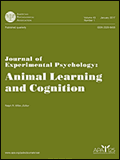
JOURNAL OF EXPERIMENTAL PSYCHOLOGY-ANIMAL LEARNING AND COGNITION
Decoding Learning Processes in the Animal KingdomJOURNAL OF EXPERIMENTAL PSYCHOLOGY-ANIMAL LEARNING AND COGNITION, published by the American Psychological Association, stands as a pivotal resource in the fields of animal learning and cognitive psychology. With an ISSN of 2329-8456 and an E-ISSN of 2329-8464, this journal has established its significance from its inception in 2014, demonstrating a robust commitment to advancing research through 2024 and beyond. The journal's prominence is reflected in its 2023 rankings, placing it in the Q2 quartile for both Ecology, Evolution, Behavior and Systematics and Experimental and Cognitive Psychology, which positions it among the leading publications in its domains. Researchers and professionals engaged in the intricate study of animal behavior, cognition, and their underlying psychological mechanisms will find this journal invaluable. Although it does not currently offer open access, the quality and rigor of the published research make it a key reference for advancing knowledge and understanding in psychology and beyond.
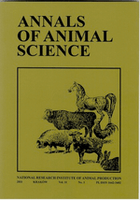
Annals of Animal Science
Connecting Professionals Through Open Access KnowledgeAnnals of Animal Science is a prestigious academic journal, published by Walter de Gruyter GmbH in Germany, specializing in the multifaceted field of Animal Science. With an ISSN of 1642-3402 and an E-ISSN of 2300-8733, this journal is recognized for its high-impact contributions, holding a commendable impact factor that demonstrates its relevance in nurturing quality research. The journal has garnered Q2 rankings in 2023 across various categories including Animal Science and Zoology, Food Animals, and Small Animals. Notably, its Scopus Rankings indicate an elite standing, with the journal placing in the top 10% within its specific fields. Covering converged years from 2008 to 2024, the Annals of Animal Science serves as an essential platform for researchers, professionals, and students to disseminate knowledge and advance studies related to animal health, welfare, and production. The journal also emphasizes open access, promoting broader accessibility to foster collaboration and innovation in Animal Science globally. For those committed to advancing their understanding of veterinary and agricultural sciences, this journal is a vital resource.
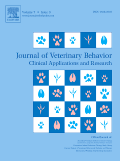
Journal of Veterinary Behavior-Clinical Applications and Research
Empowering veterinarians with cutting-edge behavioral knowledge.The Journal of Veterinary Behavior-Clinical Applications and Research, published by Elsevier Science Inc, is a premier outlet for original research and clinical studies in the field of veterinary behavior. With an ISSN of 1558-7878 and an E-ISSN of 1878-7517, this journal serves as an essential resource for veterinarians, animal behaviorists, and researchers dedicated to understanding and improving animal welfare through behavioral science. The journal holds a respectable Q2 ranking in the Veterinary (miscellaneous) category as of 2023, attesting to its significant impact in the field. Although it does not offer open access options, it fosters a community of professionals who are passionate about advancing the application of behavioral research in clinical settings. With coverage extending from 2006 to 2024, the journal aims to disseminate valuable insights that contribute to effective behavior management and intervention strategies, ultimately enhancing the relationship between animals and their caregivers.

SOCIETY & ANIMALS
Innovating Perspectives on Interactions with the Animal WorldSOCIETY & ANIMALS is a distinguished journal published by BRILL that has been a vital platform for interdisciplinary research at the nexus of human-animal studies since its inception in 1993. With an ISSN of 1063-1119 and an E-ISSN of 1568-5306, this journal offers valuable insights into the philosophical, sociological, and political dimensions of human relationships with animals. It holds an impressive standing, ranked Q2 in the field of Philosophy, Q3 in Sociology and Political Science, and Q4 in Veterinary (miscellaneous) categories, demonstrating its diverse relevance across multiple disciplines. By bridging academic inquiries with contemporary societal issues, SOCIETY & ANIMALS facilitates an engaging dialogue among researchers, professionals, and students, encouraging a deeper understanding of our evolving interactions with the animal world. Although currently not an open-access journal, it remains an essential resource for scholarly work and continues to influence research trends within the realms it covers.

INTERNATIONAL JOURNAL OF PRIMATOLOGY
Shaping the Future of Primate StudiesINTERNATIONAL JOURNAL OF PRIMATOLOGY, published by Springer, stands as a pivotal publication in the fields of Animal Science and Zoology, as well as Ecology, Evolution, Behavior, and Systematics. With an impressive impact factor that places it in the Q1 category for both disciplines, this journal facilitates the dissemination of high-quality, peer-reviewed research that spans a diverse array of topics related to primate biology and conservation. Established in 1980 and continuing through 2024, it provides a vital platform for researchers, professionals, and students alike to explore the complexities of primate behavior, ecology, and evolution. While currently not offering open access, the journal is highly respected within the academic community, reflected in its Scopus Rankings that highlight its sustained influence and contribution to the field. The journal's commitment to advancing knowledge and understanding of primate species makes it an essential resource for anyone dedicated to this important area of study.

CANADIAN VETERINARY JOURNAL-REVUE VETERINAIRE CANADIENNE
Elevating animal health through rigorous research.Canadian Veterinary Journal - Revue Vétérinaire Canadienne is a prominent peer-reviewed journal published by the Canadian Veterinary Medical Association. Established in 1965, this journal aims to advance knowledge within the field of veterinary medicine and contributes significantly to the development of veterinary practices through the dissemination of high-quality research. With a robust focus on both general and specialized veterinary studies, the journal holds a Q2 ranking in the Veterinary (miscellaneous) category and a Q3 categorization in Medicine (miscellaneous) as of 2023, reflecting its vital role in academic discourse. Researchers and professionals can expect a diverse range of topics that explore the intricacies of animal health and welfare, making it a vital resource for advancing veterinary science in Canada and beyond. Although the journal does not operate under an open access model, it remains a respected platform for disseminating impactful research. With a long-standing tradition of excellence, the Canadian Veterinary Journal is an invaluable tool for veterinarians, researchers, and students committed to enhancing animal health and veterinary practices.
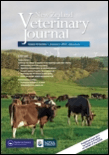
NEW ZEALAND VETERINARY JOURNAL
Exploring the forefront of animal welfare and medicine.NEW ZEALAND VETERINARY JOURNAL, published by Taylor & Francis Ltd, stands as a pivotal platform in the realm of veterinary science, contributing significantly to the global discourse on animal health and welfare since its inception in 1952. With an ISSN of 0048-0169 and an E-ISSN of 1176-0710, this journal offers invaluable insights within both the veterinary and general medical fields, currently achieving a commendable Q2 ranking in Veterinary (miscellaneous) and Q3 in Medicine (miscellaneous) for 2023. Its Scopus ranking places it in the 76th percentile among veterinary journals, affirming its high-impact presence in academia. While access to this journal is not open, it maintains an essential role for researchers, professionals, and students aiming to advance their knowledge and contribute to the field of veterinary science. With a commitment to disseminating quality research, NEW ZEALAND VETERINARY JOURNAL enriches the understanding of veterinary practices and enhances ongoing dialogue on critical health issues affecting animals, promoting better outcomes through scientific inquiry.
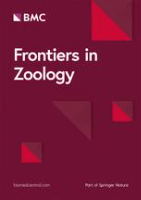
Frontiers in Zoology
Leading the charge in open-access zoological scholarship.Frontiers in Zoology is a premier, open-access journal published by BMC that has been a cornerstone of zoological research since its inception in 2004. With a commitment to advancing the field, this journal covers a broad spectrum of topics within Animal Science and Zoology, as well as Ecology, Evolution, Behavior, and Systematics. Recognized for its quality, it holds a distinguished Q1 ranking in both of these categories and ranks within the top percentiles in Scopus, with 87th and 78th percentiles, respectively. Based in the United Kingdom, it provides researchers, professionals, and students with innovative studies and findings that encourage interdisciplinary collaboration and exploration. The journal is dedicated to facilitating the open exchange of scientific knowledge, making it an essential resource for those seeking to stay at the forefront of zoological and ecological sciences.

EXPERIMENTAL ANIMALS
Innovating methodologies for a better understanding of animal models.EXPERIMENTAL ANIMALS is a leading journal that serves the vibrant fields of Animal Science, Veterinary Medicine, and Biochemistry, Genetics, and Molecular Biology, published by the prestigious INT PRESS EDITING CENTRE INC in Japan. Boasting an impressive track record since its inception in 1974, the journal has positioned itself as a crucial platform for researchers aiming to disseminate innovative findings in experimental animal research. With a commendable impact factor and categorized in the Q2 and Q3 quartiles by Scopus in various relevant fields for 2023, EXPERIMENTAL ANIMALS exemplifies excellence in its contributions to science. The journal offers a comprehensive range of articles spanning from animal welfare and experimental methodologies to genetic studies, ensuring a multidisciplinary approach that appeals to a diverse audience of researchers, professionals, and students. Access to its wealth of knowledge fosters significant advancements in research and practice, underlining the journal's commitment to enhancing understanding of animal models in scientific inquiry.

Thai Journal of Veterinary Medicine
Championing research for animal welfare and public health.Thai Journal of Veterinary Medicine, published by Chulalongkorn University, serves as a vital resource for researchers, practitioners, and students in the field of veterinary science. With an ISSN of 0125-6491, the journal has been providing a platform for the dissemination of original research and reviews since its inception, with a focus on advancing veterinary practice and animal health in Thailand and the broader Southeast Asian region. The journal is recognized in the Scopus database, currently ranked in the Q4 category for Veterinary (miscellaneous), reflecting its commitment to quality despite being in a highly competitive space. The scope of the journal encompasses a wide array of topics pertinent to veterinary medicine, ensuring accessibility to diverse veterinary disciplines. While the journal currently does not offer an open-access option, it remains dedicated to contributing valuable knowledge and insights to the veterinary community, supporting the improvement of animal welfare and public health initiatives in the region. As it continues to publish until 2024, the Thai Journal of Veterinary Medicine invites contributions that align with its objectives of fostering scholarly discourse and advancing veterinary research.